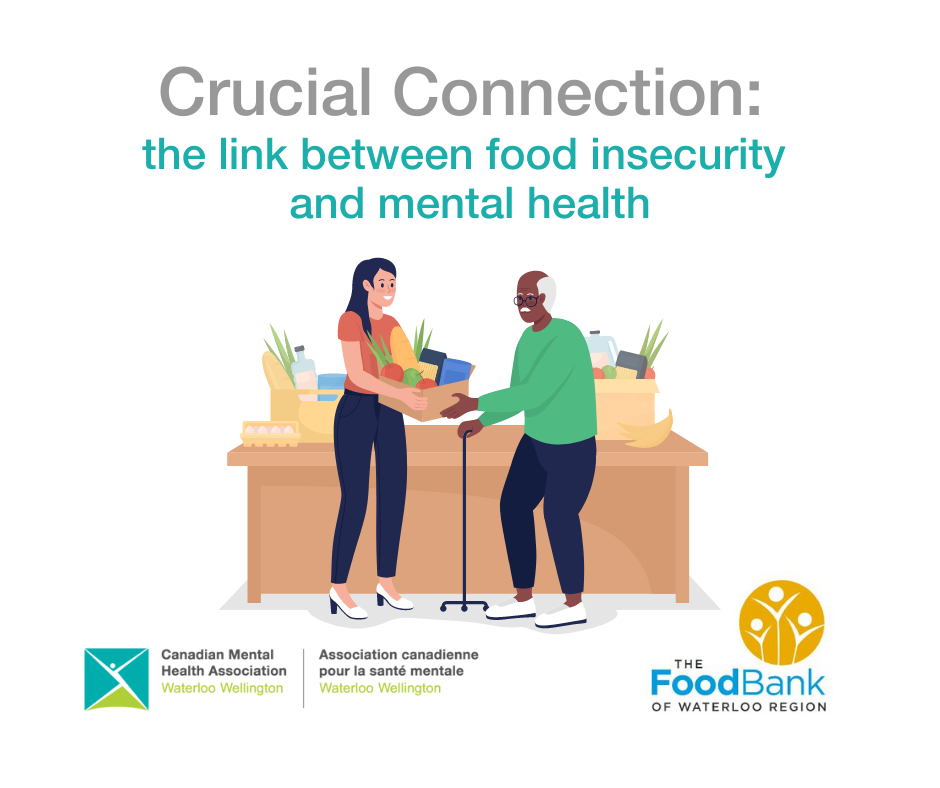Menu Close

Crucial connection: the link between food insecurity and mental health
Feb 15, 2022
JOINT BLOG POST | Canadian Mental Health Association Waterloo Wellington and The Food Bank of Waterloo Region
You may have noticed fewer boxes of cereal, baby formula or cartons of milk on store shelves. Some grocery stores are struggling to keep certain items in stock amid supply chain disruptions. Unfortunately, for thousands of local families, keeping shelves stocked with food at home is just as challenging.
The COVID-19 pandemic is worsening worries over food insecurity – the inability to access enough nutritious food because of financial constraints. More households are running out of food before they have enough money to buy more. Unable to afford healthy, balanced meals, these families and individuals are turning to local food banks for support.
The Food Bank of Waterloo Region has seen an 80 per cent increase in the number of new households served over the past three months, a record high since the start of the spread of COVID-19. However, the rise in precarious work, housing unaffordability, and systemic oppression have been contributing to rising food insecurity for years prior to the pandemic, with poverty being the biggest barrier.
Tackling food insecurity is not just about putting food on a plate; it is a public health issue. The inability to access food directly impacts our physical and mental health. A Stats Can study shows the number of people surveyed who reported poor mental health was higher among people in households with moderate or severe food insecurity. These households are often forced to make difficult and stressful decisions due to low or fixed incomes, such as having to choose between paying rent and buying groceries.
Food insecurity is linked to higher rates of depression, stress, and anxiety. There is also a sense of shame, which can significantly impact someone’s feeling of social acceptance. For those who need them, food assistance programs provide a great sense of belonging. The Community Food Assistance Network, a system of 100+ community programs and agency partners, provides food and connection to other supports needed by children, seniors, families and individuals in Waterloo Region.
Last year, the network served 34,620 individuals. One in 20 households in Waterloo Region accessed an emergency food assistance program. Nearly half of the people who depend on the food bank are single, and 75 per cent of them are renters.
In periods of difficulty, particularly during the pandemic, there is often an outpouring of support from the community. But food banks should not be the solution to food insecurity. The 2021 Hunger Report says while food banks work hard, only strong public policies and government action can bridge the gap between income and the cost of living. In the meantime, with your help, The Food Bank of Waterloo Region can continue to make sure no one goes hungry and offer a sense of community for those who need it most.
Vital Supports and Resources
Anyone can access food assistance. Find a food program at thefoodbank.ca/map or call our referral line at 519.743.5576 ext. 340. Donations can be made online at thefoodbank.ca/donate. In-person drop-offs at The Food Bank’s facility at 50 Alpine Court in Kitchener are also welcome.
CMHA Waterloo Wellington works daily to promote mental health, recovery and resilience in the community. But we can’t do it alone. You can support CMHA WW by making a donation at www.cmhaww.ca/donate. Your gift will help CMHA WW help people experiencing mental health issues, including their families and caregivers, to access information and support as soon as they need it. You can also access 24-hour support through our Here 24/7 Crisis Support at 1-844-437-3247.